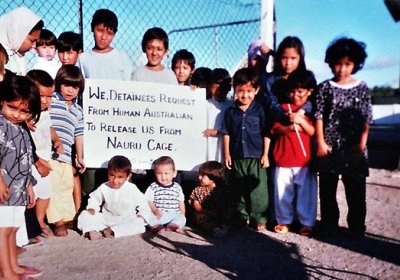Simon Butler was a 25-year-old activist who helped organise the mass mobilisations in Sydney in February and March 2003 against the invasion of Iraq. He was also a leader of the socialist youth group Resistance and the student anti-war movement Books Not Bombs, which Resistance initiated.
Australia
When NSW members of parliament from both Labor and Coalition start campaigning against coal seam gas (CSG) — and the federal Labor Party starts musing that it might impose “strict regulations” on state governments to control the industry — you know that the movement against this dirty fossil fuel is starting to pack a punch.
CSG was hardly known two years ago. Today, the thought of it frightens people. Gas companies have poured millions into advertising to reassure people that the industry is safe — but it hasn’t worked.
Lip-stitching and attempted self-immolation are among increasingly extreme acts of self-harm taking place in Australia’s two offshore detention camps in recent weeks.
Hunger strikes, cutting and attempted hangings have already become widespread in the tent city on Nauru. But, on February 19, for the first time since the “dark days” of former prime minister John Howard’s “Pacific solution,” refugees stitched their mouths closed to protest their arbitrary and indefinite detention.
Angry residents from Kemps Creek and surrounding neighbourhoods packed the local sports and bowling club auditorium on February 18 to protest against the state government’s plan to dump radioactive waste in the area.
The NSW Liberal government is proposing to shift 5800 tonnes of soil from an area in Hunters Hill, where a uranium ore processing plant once stood, to the Kemps Creek SITA dump site.
Cancer clusters have been detected in Hunters Hill, which have been linked to the contamination left behind at the former plant site.
This statement was released by Stop CSG Illawarra on February 19.
***
The NSW government has announced new coal seam gas (CSG) rules, including a ban on CSG development in residential areas and critical industry clusters, such as horse breeders and wine producers. But they also stated this would only apply to new CSG exploration, assessment and production activities, and they have not ruled out drinking water catchments.
This statement was released by the Socialist Alliance Moreland councillor Sue Bolton on February 20.
***
Experienced crane driver and union activist Billy Ramsay was killed on the Grocon construction site in central Melbourne on February 18. This news was buried many pages inside the Murdoch-owned Herald Sun daily tabloid.
More than 30,000 Victorian teachers and education support (ES) staff walked off the job on February 14 in their campaign for better pay and conditions.
Government figures show that 65% of school staff took part in strike action and 300 schools did not have students. Meredith Peace, Australian Education Union (AEU) state president, also reported that more than 300 schools were brought to a standstill and that every school in the state had some form of disruption.
Northern Territory Chief Minister Terry Mills announced a deal on February 8 to secure power for the Nhulunbuy bauxite mine and alumina refinery. The deal was hailed as saving the community through protecting the industry that provides it with half its jobs.
But the decision has disastrous environmental impacts and shows the lack of choices available to remote communities under the logic of the mining market. To survive, communities are asked to provide public funds to private companies to perform environmentally damaging activity.
The Yindjibarndi Aboriginal Corporation released this statement on February 13.
***
On February 12, Federal Court Justice Neil McKerracher handed down a decision that validated the vote of the Yindjibarndi people to authorise a new and unified applicant group of 12 Yindjibarndi men and women to run the Yindjibarndi #1 claim — this includes the area of vacant crown land where [Andrew “Twiggy” Forrest’s] Fortescue Metals Group (FMG) is developing the Solomon Hub and “Firetail” mine.
Mental illness will affect someone you know and love. Forty-five percent of Australians will experience a mental health problem and 20% of the population is affected each year in a serious way by conditions including anxiety disorders, depression, personality disorders, schizophrenia or bipolar disorder, to name just a few.
Many people with mental illnesses want to work and are able work. But the barriers to suitable employment are much higher than for most. This is why the Disability Employment Services exist for all people with disability, be they mental, physical or psychological.
Britain’s House of Commons voted in favour of equal marriage rights on February 5. France’s lower house approved a bill for equal marriage rights on February 12.
If these bills make it the rest of the way through their respective parliaments, Britain and France will join the Netherlands, Belgium, Canada, Massachusetts, Spain, South Africa, Norway, Sweden, Portugal, Iceland, Argentina and Denmark in having equal marriage rights.
Federal environment minister Tony Burke has rejected National Heritage listing for the Tarkine wilderness.
On February 8, Burke announced 10 new mines proposed over the next five years for the Tarkine wilderness area. Nine of these 10 mines will be open cut leaving scars of devastation in an area of north-western Tasmania.
- Previous page
- Page 673
- Next page







